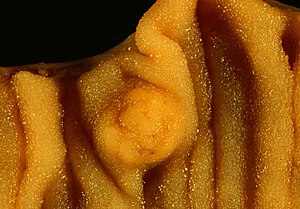Carcinoid
| Carcinoid | |
|---|---|
 |
|
| Picture of a carcinoid tumor (center of image) that encroaches into the lumen of the small bowel (pathology specimen). The prominent folds are plicae circulares, a characteristic of the small bowel. | |
| Classification and external resources | |
| Specialty | Oncology |
| ICD-10 | C75, E34.0 |
| ICD-9-CM | 209.60 |
| ICD-O | M8240/3 |
| OMIM | 114900 |
| DiseasesDB | 2040 |
| MedlinePlus | 000347 |
| eMedicine | med/271 |
| MeSH | D002276 |
Carcinoid (also carcinoid tumor) is a slow-growing type of neuroendocrine tumor originating in the cells of the neuroendocrine system. In some cases, metastasis may occur. Carcinoid tumors of the midgut (jejunum, ileum, appendix, and cecum) are associated with carcinoid syndrome.
Carcinoid tumors are the most common malignant tumor of the appendix, but they are most commonly associated with the small intestine, and they can also be found in the rectum and stomach. They are known to grow in the liver, but this finding is usually a manifestation of metastatic disease from a primary carcinoid occurring elsewhere in the body. They have a very slow growth rate compared to most malignant tumors.
While most carcinoids are asymptomatic through the natural lifetime and are discovered only upon surgery for unrelated reasons (so-called coincidental carcinoids), all carcinoids are considered to have malignant potential.
About 10% of carcinoids secrete excessive levels of a range of hormones, most notably serotonin (5-HT), causing:
The outflow of serotonin can cause a depletion of tryptophan leading to niacin deficiency. Niacin deficiency, also known as pellagra, is associated with dermatitis, dementia, and diarrhea.
This constellation of symptoms is called carcinoid syndrome or (if acute) carcinoid crisis. Occasionally, haemorrhage or the effects of tumor bulk are the presenting symptoms. The most common originating sites of carcinoid is the small bowel, particularly the ileum; carcinoid tumors are the most common malignancy of the appendix. Carcinoid tumors may rarely arise from the ovary or thymus.
...
Wikipedia
